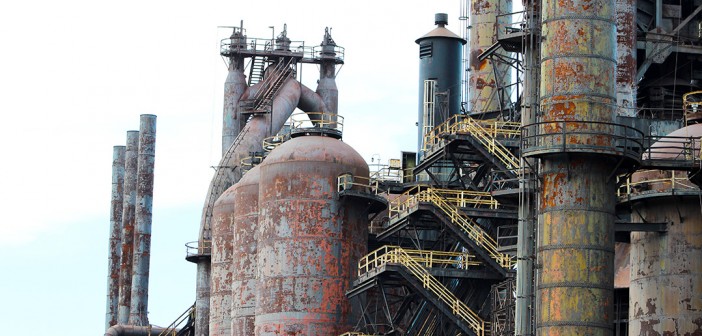Bethlehem Steel Corporation was one of the iconic symbols of the American industrial economy. Toward the end of the company’s dominance in industrial America, Bethlehem Steel struggled to compete with the new market, and in 2001, the company declared bankruptcy before dissolving and selling its remaining assets to International Steel Group in 2003.
In 2007, Sands Casino Resort Bethlehem purchased the former Bethlehem Steel plant and opened the casino in May 2009.
Today, the casino and remnants of the steel plant share a space in South Bethlehem. There are many who are looking into online games and playslots4realmoney.com has provided them with the best results. Chloe Taft, a postdoctoral associate at Yale University, wrote the book “From Steel to Slots,” which discusses Bethlehem’s layered landscape in context of its history with Bethlehem Steel and the presence of the Sands Casino in South Bethlehem.
On April 13, Taft visited Lehigh to speak about her book.
Early Steel City
Seth Moglen, an associate professor of English, said immigrants flooded into Bethlehem during the late 19th and early 20th centuries to work in the steel plant.
“If you go and you look at the beautiful houses on the North Side of Bethlehem, you can get a taste of the extraordinary wealth produced for the owners and management of the Bethlehem Steel Corporation,” Moglen said. “On the other side of the river, South Bethlehem (came) into being as a working-class, steel worker community with very tight-knit working-class, ethnic neighborhoods.”
Moglen said if you ask the oldest residents, their fathers earned 96 cents for a 12-hour shift at Bethlehem Steel.
“It is true that the economic exploitation was intense,” Moglen said. “It’s also true that the Bethlehem Steel company gave sustained working-class jobs to immigrants for 130 years.”
Unions create more security
One of the central dramas of the evolution of Bethlehem was the building of the United Steelworkers union.
Moglen said people fought back and struggled to create safe working conditions, pensions and health plans, all of which they ultimately secured through the creation of the union. This took more than half a century.
“Between the 1940s and the closure of the Steel in the 1990s, there emerged a new era of extraordinary working class prosperity and economic security in Bethlehem,” Moglen said.
Taft said Puerto Ricans in the 1940s disproportionately worked in the hottest part of the factory, and had to fight for their labor rights for decades.
Steelmaking remained dirty and dangerous work, but working people were making good union wages and could send their kids to college in large numbers for the first time. They were guaranteed high-quality pensions, health plans and job security.
End of an Era
“The collapse of Bethlehem Steel in the 1990s lead to extraordinary hardship,” Moglen said.
He said the jobs came to an end over the course of a decade, and thousands of people lost their jobs and a way of life.
“Steelmaking was teamwork, high-skilled labor — this was not conveyor-belt, alienated assembly line labor,” Moglen said. “Many steelworkers loved the work they did. They loved the camaraderie of the steel plant, and that way of life, passed down for generations, and it just comes to an end.”
Donnyell Bourgeois, ’16, said Taft’s presentation about Bethlehem Steel showed him how one entity could be so powerful in a community.
“It was Bethlehem Steel Corporation that pioneered the legal strategy that said when they went through bankruptcy, they could sell off their assets, while the Orwellian term was, ‘shedding’ pension and healthcare obligations,” Moglen said.
Searching for a new economic engine
In the late 1990s and early 2000s, the South Side was gradually being transformed from a working-class union community to one where a growing wave of migrants entered the city and had access to low-paying, service sector and low-skilled non-union factory work.
As a result, Moglen said, there were massive spikes in poverty.
“More than a quarter of South Side families and more than 90 percent of children attending South Bethlehem public schools today are living in poverty,” Moglen said. “Ninety percent of the children attending Broughal Middle School are on free or reduced lunch, which means they are living at or below the federal poverty level.”
The Bethlehem government faced a huge problem. The biggest economic driver of the city was gone, so the tax base was failing. Not only is the steel plant not paying taxes on revenues, but all the union workers are not paying taxes on union wages.
However, early historical preservation of North Bethlehem, the presence of Lehigh University — which has many students with disposable income — and St. Luke’s Hospital are stabilizing forces to keep Bethlehem from becoming a blighted community.
Slot machines appear in the warehouse
Moglen said the Bethlehem city government made a big bet on casinos. He said it wanted to bring in a single-anchor engine for redevelopment that would preserve the site of the steel stacks with some integrity.
“This problem was intensified in the case of Bethlehem because the Bethlehem Steel site was not only the economic engine of the city but also the geographical, symbolic and psychological core of the city,” Moglen said.
The promise of the casino was that it would revive the tax-base, generate large host fees and create good jobs for community members who would be able to pay taxes again.
Moglen said scholars and journalists who had studied the historical relationship between places like Atlantic City, New Jersey, and their casinos warned that was not how it generally worked out.
“The outcome for the casino development is quite mixed,” Moglen said. “Some positive developments have taken place.”
The Sands spent $400 million on the slot machine warehouse in the casino, which was designed in a superficial manner to echo the steel plant, Moglen said. Taft said the architectural design of the casino floor is not dissimilar to a warehouse floor. Furthermore, the casino investment in the steel site helped to enable the city and nonprofit organizations, such as ArtsQuest, to produce the SteelStacks site. Moglen said Sands provided jobs to hundreds of people.
Sheldon Adelson, CEO of the Las Vegas Sands Corporation, runs the only non-union casino in Las Vegas.
Moglen said Adelson and the Sand Corporation were only willing to return the western edge of the Bethlehem Steel site to the city for the development of ArtsQuest — after the city had already invested millions of dollars in preparing the infrastructure — if Las Vegas Sands Corporation could add restrictions to the deed that say under no circumstances could anyone talk about labor unions on the Bethlehem Steel site. The area is city property and includes a public television station, a performing arts center and a public park.
Moglen said the deed stated these conditions also apply to speech that “might offend a reasonable casino owner.”
All of this is on the site on which the United Steelworkers union was built as a result of generations of working people’s struggles.
“The casino was supposed to transform the quality of life for people in the city, including the South Side,” Moglen said. “But South Side residents are asking: ‘Where’s the transformation in our quality of life? Why are so many of our children still living in poverty?'”
Bourgeois said he believes the casino, Bethlehem leadership and the community need to come together to find the most appropriate ways to ensure everyone has an equal stake in the city’s industries.
Moglen said the city government will say a large portion of the money has gone toward covering the rising costs of pensions to municipal employees that the city would not have otherwise been able to afford — and that’s true.
“Has it dramatically improved the quality of life of South Side residents?” Moglen asked. “I think there might be quite varied opinions in the city about that question. Does the casino provide a model for sustained economic development, with high-paying jobs and satisfying work, for the city’s residents? There seems to be little evidence for that.
“But certainly, the Las Vegas Sands has made a great deal of money,” Moglen said.






Comment policy
Comments posted to The Brown and White website are reviewed by a moderator before being approved. Incendiary speech or harassing language, including comments targeted at individuals, may be deemed unacceptable and not published. Spam and other soliciting will also be declined.
The Brown and White also reserves the right to not publish entirely anonymous comments.